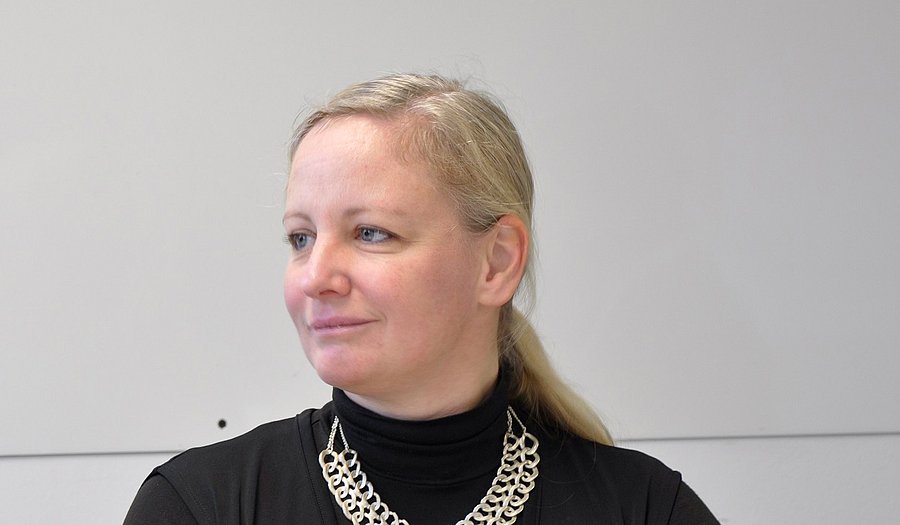
From Art to Technology – Everything is Possible in the Field of Architecture:
Prof. Dr. Tanja Siems and the Department of Urban Development
A major concern for Prof. Dr. Tanja Siems, who heads the Department of Urban Development at the University of Wuppertal, is to ensure that students are able to maximise their practical knowledge by being permitted to carry out independent project work.
A major recent example is “Project Bergisch Land”, the core of which involved interdisciplinary summer academies at the University of Wuppertal between 2013 and 2015. “This was a long-term project”, Prof. Siems explained, “which was augmented and expanded and, above all, anchored within the region by numerous sub-projects over a three-year period”. The three core projects involved the revitalisation of a vacant shop (address: Markt 13) in Remscheid, re-purposing a listed municipal bathhouse (Birker Bad) in Solingen, and the Mirker Bahnhof (Railway Station) Project in Wuppertal.
The approach taken was also new: the students were allowed to go out to explore the region and independently identify projects that were of importance to local people. “What they needed for this was intuition, an experimental attitude and communication skills”, said Dr. Siems, “not a set of urban development planning tools!” Reconnaissance forays, reading, pictures, experiences and ideas formed in the course of lively discussions with ordinary people on the streets, formed a conceptual mosaic, which had to be pieced together. The architectural students were joined by an interdisciplinary group of budding art, design and cultural researchers in addition to economists and sociologists all operating under the motto ‘discover what actually exists’.
As Professor Siems concludes: “the closely supervised work carried out in small, interdisciplinary teams which included internationally renowned experts, introduced students to novel approaches to learning and working, provided them with opportunities for unusual excursions and helped them to acquire numerous contacts, and resulted in a comprehensive set of published results”.
Planning Refugee Accommodation Well in Advance of the Refugee Wave
In addition to “Project Bergisch Land”, Dr. Siems offers numerous other service learning projects. Whether it’s an international summer academy in Berlin held under the title “Urban Change – Solar Energy in an Urban Development Context” or re-purposing vacant industrial building stocks as housing for senior citizens across the region on behalf of the Wuppertaler Tafel charity organisation, all design assignments are predicated on meeting the needs of the users. A total of 35 students were involved in the Wuppertaler Tafel project. One of the exciting things about it was that the research project had already been looking into the issue of refugee accommodation long before the arrival wave of refugees in 2015. Following a successful six-month project phase, urban developers are now also getting involved in the construction planning.
Dr. Siems sees her own role in each project as that of a catalyst. She offers encouragement and ideas, but lets students operate independently and tweaks this and that along the way in addition to ensure that regional residents are involved in all planning initiatives. She is a keen proponent of interdisciplinarity, both in relation to her own professorial chair and in her capacity as Head of the Institute for Environmental Development in which colleagues from a range of faculties can collaborate and contribute with their specific know-how. She participates in various competitions alongside civil engineers and offers a number of interdisciplinary teaching modules.
As an urban developer, she also has a view on the redevelopment of the Wuppertal Railway Station. Ideally, she would have liked to have seen a shared utilisation of the ground-floor of the Federal Railways Building by the University of Wuppertal. Perhaps it could have been used as a student office so that commuters could have seen at first hand how a university works.
More Men in Architecture
And then she comes out with something quite unexpected: Siems is keen to see “more men in Architecture”! For, whilst the field as a whole is still dominated by men, most of the students taking Architecture at the University of Wuppertal are women. Why? The professor can only hazard a guess and refers to the artistic and design-oriented aspects, which, she thinks, may be more appealing to women. She would welcome more male students with a keen interest in the subject and emphasises the fact that the field of Architecture encompasses everything from art to structural engineering. Purely design-based architecture accounts for only a very small proportion of all architecture around the world. As such, she says, the discipline entails a plethora of unimagined possibilities which students will soon be able to learn about at the university once again. The School of Architecture and Civil Engineering will, of course, be represented at the open days on the 14th and 16th to 27th of January 2017.
Always on the lookout for new challenges herself, Dr. Siems has discovered another exciting project in Wuppertal. The so-called Mirker Quarter Project, whose objective is the realisation of a holistic district development plan, is a spin-off of the Mirker Bahnhof Project. This also involves interdisciplinary planning and the concept of intra-regional research & knowledge transfer.
Anything is possible in the field of Architecture.
(Talk from November 2016)
Prof. Dr.-Ing. Tanja Siems received her doctorate from the University of Hanover in 2002 for a thesis on “Urban and Transportation Systems Development in the East and West of Germany”. She has been employed as a professor at the University of Wuppertal since 2009, where, in addition to heading up the School of Architecture and Civil Engineering, she is also Head of the Institute for Environmental Development. The Institute for Environmental Development operates on an interdisciplinary basis, which involves forging links between different faculties and departments within the University of Wuppertal as well as national and international networking.
